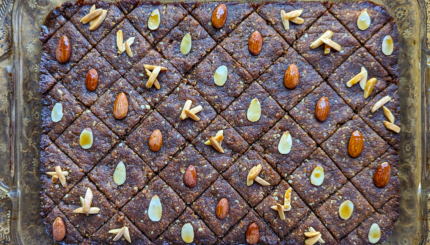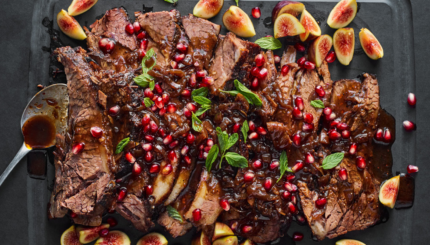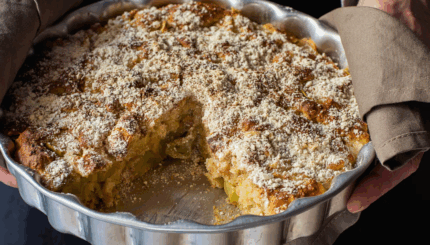The High Holidays—like many Jewish holidays—are a foodie’s delight. Whether we’re feasting on Rosh Hashanah or abstaining—and then feasting—on Yom Kippur, it’s safe to say that many people’s experience of the holiday season is replete with delicious nosh. And the foods are rich with symbolic meaning.
With the holidays approaching, you might be wondering what kinds of gifts are appropriate to give to family members, friends, and dinner hosts. Since everyone loves a gift they can eat, we’ve pulled together this gift-giving FAQ with help from our friends at Kosher Gift Box.
Rosh Hashanah begins at sundown on September 24, Yom Kippur at sundown on October 3 and Sukkot on October 8. So nosh fast!
What are some basic gift items you recommend?
Since we’re talking edible gifts here, we dig Kosher Gift Basket’s Rosh Hashanah Traditions Basket and their Sweet New Year Basket. If you’re looking for a gift appropriate for Rosh Hashanah, Yom Kippur, and Sukkot, we recommend this delicious apple cake or traditional round challahs (perhaps paired with a delicious assortment of honey).
Is it appropriate to give a Rosh Hashanah gift to clients and customers?
Gift-giving is not a traditional part of the High Holidays as it is with Hanukkah, but we’ve never known of anyone to protest. And it can make good business sense. Some popular corporate choices are Shana Tova Wine Duo or Rosh Hashanah Elegance Basket.
What should I give my Jewish boss or coworker for Rosh Hashanah?
The best gifts for work-related recipients are probably non-personal items such as a gift basket that reflects Jewish tradition. Popular choices are our 5775 Breakfast Basket or a Honey Server and Dish Set with honey.
What do you recommend for a college student?
No better way to nudge college kids to mark the Jewish holidays than to lure them with delicious traditional foods. Our Rosh Hashanah Traditions Basket includes challah, babka, and rugelach—or you could send our holiday challah set. These gifts reflect holiday traditions and are great for sharing with roommates.
Does my gift need to be kosher
?
Unless you know for a fact that your recipient does not keep kosher, providing certified kosher food ensures that everyone can enjoy the gift. All items at Kosher Gift Box are certified kosher.
We are going to our neighbors’ for Yom Kippur break-fast. What should I bring?
After fasting on Yom Kippur, a typical menu for break-fast is a dairy meal: lox and bagels, sweet kugel (noodle pudding), assorted cheeses, blintzes and fresh fruit. For dessert, our Sweet New Year Rugelach Collection, apple cake, or our Holiday Lox and Bagel Basket.
What is an appropriate gift to bring to dinner in the Sukkah?
Because Sukkot celebrates the harvest, gifts that reflect this are optimal. A dried fruit platter or fresh fruit basket make excellent choices.
How can I learn more about the High Holidays?
Check out our Rosh Hashanah, Yom Kippur, and Sukkot articles. There’s a few days of reading right there!
challah
Pronounced: KHAH-luh, Origin: Hebrew, ceremonial bread eaten on Shabbat and Jewish holidays.
kosher
Pronounced: KOH-sher, Origin: Hebrew, adhering to kashrut, the traditional Jewish dietary laws.
kugel
Prounounced: KOO-gull (oo as in book), Origin: Yiddish, traditional Ashkenazi casserole frequently made with egg noodles or potatoes.
Rosh Hashanah
Pronounced: roshe hah-SHAH-nah, also roshe ha-shah-NAH, Origin: Hebrew, the Jewish new year.
Sukkot
Pronounced: sue-KOTE, or SOOH-kuss (oo as in book), Origin: Hebrew, a harvest festival in which Jews eat inside temporary huts, falls in the Jewish month of Tishrei, which usually coincides with September or October.
Yom Kippur
Pronounced: yohm KIPP-er, also yohm kee-PORE, Origin: Hebrew, The Day of Atonement, the holiest day on the Jewish calendar and, with Rosh Hashanah, one of the High Holidays.


